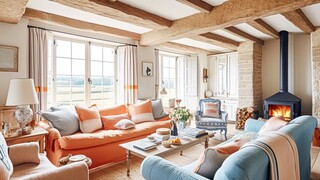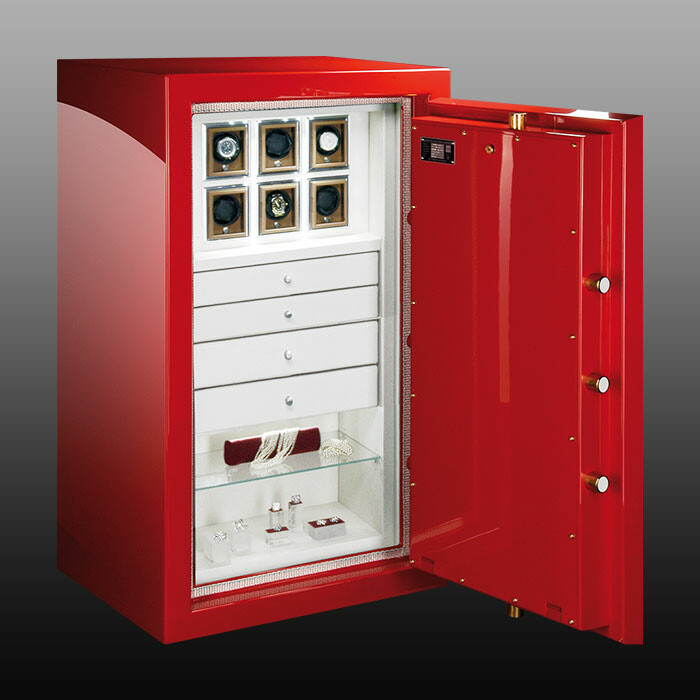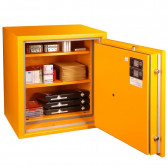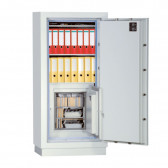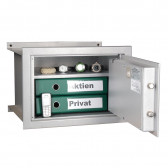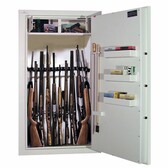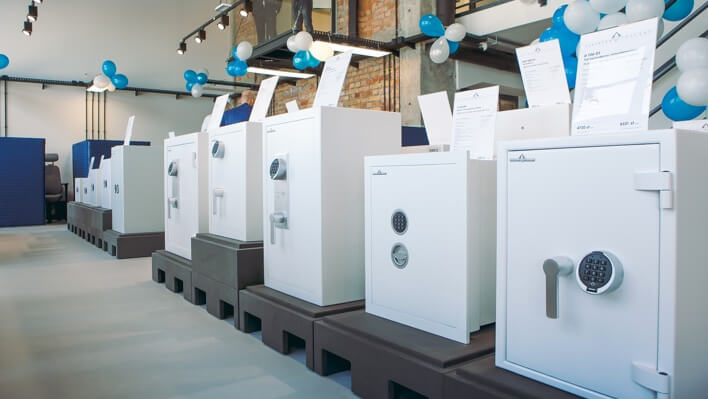A safe is not just a box for money, jewellery or documents. It's also a way to protect your possessions, data and privacy from theft, fire or other threat. Why should you buy a safe? Here are a few reasons:
What are the merits of having a safe at home?
A safe at home provides security and peace of mind. You don't have to worry about someone breaking into your home or office and taking what's important to you. The appliance protects your costly items from unauthorised access and damage.
A strongbox is an investment in the future. You don't know what might happen tomorrow, next week or next year. Maybe you will need your identity card, entry of birth, contract or certificate. Maybe you will want to sell or inherit your finery, watch or coin collection. Maybe you will need to prove your ownership of a property, car or business. A safe stores these documents and valuables in a protected place where they won't get lost, damaged or lose their value.
A safe is a time and money saver. You don't have to waste time looking for your belongings in cupboards, drawers or boxes. Nor do you have to spend money renting a bank safe deposit box or a hotel safe. Your strongbox is always at hand, ready to use and tailored to your needs.
A safe is protection against fire. Some products are heat-resistant and can withstand up to two hours in flames. This means that your papers, cash, hard drives or storage media will not burn in the event of a fire and will still be readable and operational.
A strongbox is a guarantee of privacy. You don't have to share your secrets, plans or dreams with anyone who shouldn't know about them. A safe at home protects your privacy from the prying eyes of family, friends, colleagues or the secret service.
That's it in a nutshell. Let's look at the subject in more detail.
What can you keep in a safe?
It will not come as a surprise if we write that you can keep in a safe whatever you fear losing. And these can be valuable things of very different kinds and their value does not necessarily have to be monetary. For the purposes of this text, let us group the contents of the strongbox into several categories:
• significant papers such as deeds, securities, invoices, diplomas, certificates or personal documents. As these are flammable items, if you want to store significant papers in a safe, it is worth investing in a home fire-resistant safe.
• money. It is always a good idea to keep a little bit of cash at home for a so-called 'rainy day', but quite a few people choose to store even sizable sums of money at home. In this case, a home safe with a high burglary resistance rating and considerable weight will be advisable. Cash does not take up much space, so it does not need to be a large-sized safe.
• valuables, i.e. usually personal finery, which is increasing over the years. If one of the household members is a woman, a safe at home will undoubtedly come in handy :)
• collector coins or other precious items that you collect.
• watches, or, as the popular saying goes, the only piece of jewellery (for those willing – apart from a wedding ring) that befits a man. Watches can represent serious financial and sentimental value. If you want to store automatic watches for a long time, it is worthwhile investing in watch winders.
• valuable items of sentimental value, such as photographs, albums, letters or keepsakes. Securing these types of personal items, the loss of which is irreparable and irreversible, is what we care most about.
• data stored on media such as hard disks, memory sticks, CDs/DVDs. In this case, a fire-resistant home safe of the S60 DIS or S120 DIS class will be indispensable.
What types of safes are there?
If, having read the above, you think it's proper having a safe at home you need to take a look at what kinds and models are available, what the differences are and which home safe will be most suitable just for you. This can help you to opt for a free-standing safe or a concealed one, i.e. a floor safe or a product installed into a wall or piece of furniture.
A small home safe
When asking about a home safe for storing valuables, customers most often imagine a device commonly referred to as a furniture safe, i.e. a small, compact armoured box that you hide in a wardrobe or build in. Does such a home safe make sense?
Absolutely. Just because a home safe is small does not mean that the items stored in it are not properly protected against uncalled people, as we will mildly call a thief here. A small home safe with a high burglary resistance rating will be much safer than a furniture safe in a low class.
A wall safe at home
Wall safes are a specific type of armoured cache, which is mounted not to the wall, but in the wall, in a pre-prepared hole. When buying a wall safe for their home, customers are most often guided not only by elementary considerations such as a sense of security, but also by space saving. Whatever its final size, the wall safe will not encroach on the space of a flat or house. These appliances can also be easily concealed behind furniture or decorative elements, making them less visible to intruders.
It is significant to consider that wall safes cannot be fireproof. Fireproofing requires a tight and strong construction on all sides, which is not feasible with wall safes.
Fire-resistant home safe
If you not only want to keep costly things protected from theft, but you are also thinking about important papers, it is proper investing in fire resistance. Burglary resistance is one thing, but a fire can happen. Fire-resistant safes can range from small enough to put in a cupboard up to large, typical office safes for storing more files.
The level of protection against fire is expressed in minutes, and in our range you will find fireproof safes ranging from 30 to 120 minutes.
Fire-resistant strongboxes are an excellent choice for a house, where a fire hazard is more likely than a housebreaking.
Weapon safe
The requirements for a gun safe are regulated by the (Polish) Weapons and Ammunition Act, which requires the owner of a gun safe to have an armoured box at least of the S1 grade according to EN 14450. When choosing a safe in class S1, however, it should be remembered that this is the lowest, most basic level of security, so if you also want to keep valuable things in the strongbox, select a higher class, at least class 0 or I.
Depending on whether you need a safe for long or short weapons, the unit can take a larger or smaller form.
Which options to choose?
When purchasing an armoured cache for your home, you will come across many possibilities that may interest you. A home safe needs to be not only secure, but also convenient to use. If you have already decided on a strongbox, it's time to get into the details.
Personalising a safe involves several aspects, more or less important. Various options are available, such as the colour of the paint, its texture, the type of lock: key lock, electronic or mechanical combination lock. There are numerous models of locks available on the market that differ in their functionality. The pinnacle of sophistication is the biometric lock.
You can choose the number of shelves, an additional internal cubby locked by a separate mechanical or electronic lock, and you can decide on the direction of door opening (right- or left-sided).
A bespoke safe
For the most demanding customers who need something special, we offer safes developed and manufactured to special order. Their uniqueness can have several levels, starting with the combination of colour, equipment and lock. Bespoke safes can be designed as true luxury items, combining the highest security grade with exclusive materials and exceptional craftsmanship.
If you want to keep items such as finery, watches, collector's coins or other preciosities in the safe, it is worthwhile investing in one that is not only secure but also beautiful.
You can select a strongbox from a wide range of models, choosing the class of safe that corresponds to the value of the items you are storing, and then matching the colour and paint texture, such as high gloss. Once this is ready, consider the layout and materials for the interior finish. Ecological leather or alcantara are involved, but also glass, stainless steel.
Is it worthwhile having a safe?
Definitely yes! Safes, whether they are wall safes, floor safes, furniture safes, free-standing safes, fireproof safes or exclusive safes, give you a feeling of security, the freedom to keep what you care about securely at home and a peaceful night's sleep.
You can keep what is most precious to you in safes. When choosing a safe, it is a good idea to opt for a place of installation where the safe will not disturb you, but will give resistance to undesirable people. The armoured box in your own house or flat, its weight based on its security class, its fireproofing or its approved key or electronic lock are, in this day and age, the assurance that what you fear losing most will be safe.
How to buy a safe?
A home safe can be an easy purchase. You'll find a wide range of compact units, quite a few of which are in stock. If you're looking for more – just email or call us. We will help you find the appropriate model for you.
